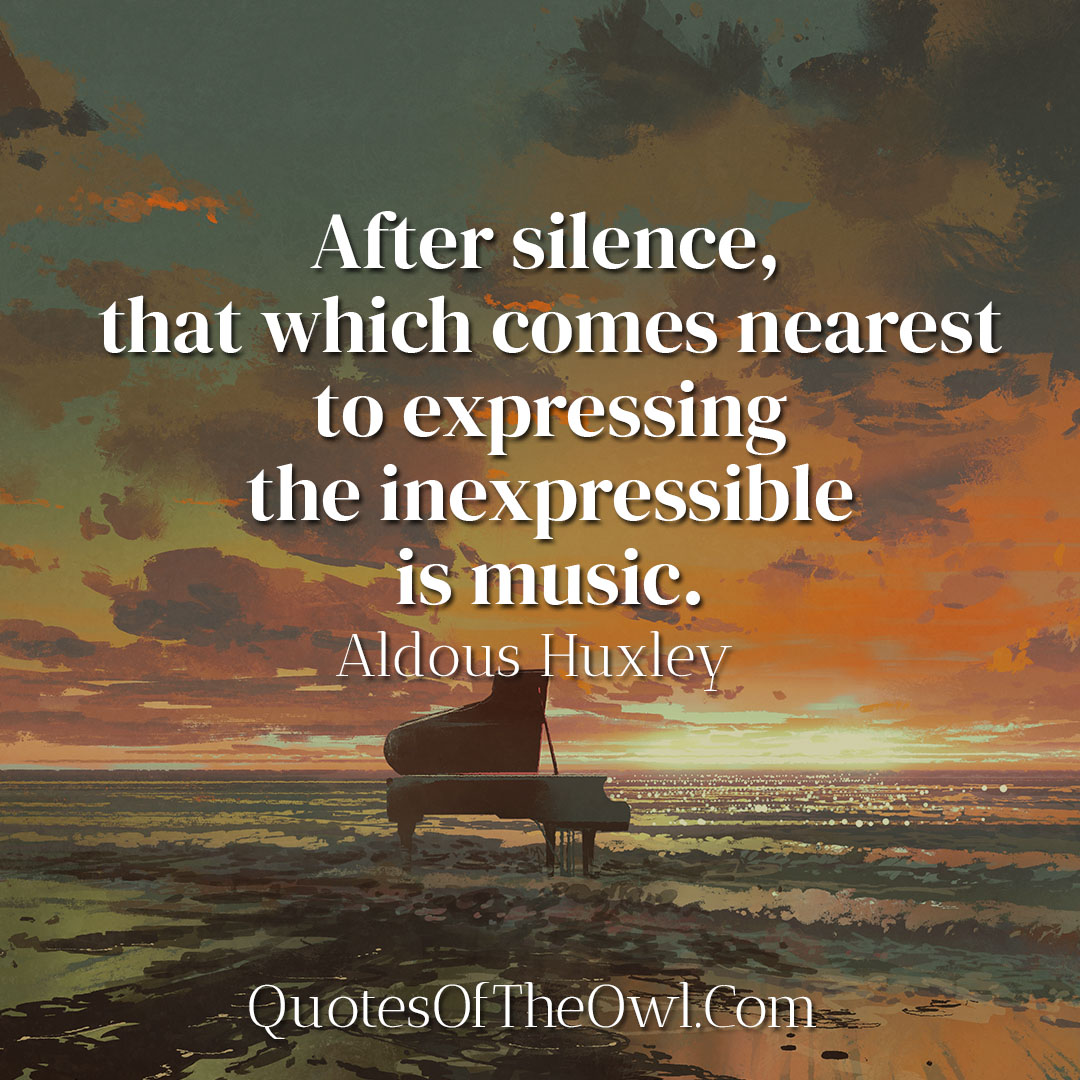After silence, that which comes nearest to expressing the inexpressible is music – Aldous Huxley’s Quote Meaning
Music has always held a unique place in human culture. It has the ability to touch our souls, to elicit emotions that words often fail to convey. As Aldous Huxley once said, “After silence, that which comes nearest to expressing the inexpressible is music.” This profound quote highlights the remarkable power of music as a medium of expression, capable of traversing the boundaries of language and reaching deep into the core of our being.
The Power of Silence
Silence, in its profound depths, holds immense potential. It is the canvas upon which the symphony of life unfolds. Silence is not merely the absence of sound but a rich tapestry of possibilities. It allows for introspection, contemplation, and the reception of the subtle vibrations that music brings to life.
The Inexpressible Nature of Emotions
Human emotions are complex and often defy straightforward description. The vast spectrum of feelings, from profound joy to inconsolable grief, can stretch the limits of language. Emotions carry nuances and depths that go beyond the surface-level meanings of words.
Music as an Emotional Language
Where words fail, music finds its voice. Music has the remarkable ability to convey emotions directly to the heart and soul. Its universal language transcends cultural barriers, touching people of different backgrounds in profound ways. Whether it’s the haunting melody of a melancholic composition or the uplifting rhythm of an energetic tune, music has the power to stir emotions deep within us.
Music as a Medium of Self-Expression
Music allows individuals to express themselves authentically and freely. Whether through playing an instrument, singing, or composing, music provides an avenue for personal expression that transcends the limitations of traditional communication. It serves as a cathartic release for the artist and resonates with listeners who find solace and understanding in the melodies and lyrics.
The Boundless Interpretations of Music
The beauty of music lies in its ability to evoke different emotions in different people. Each listener brings their unique perspective, memories, and experiences, which color their interpretation of the music they hear. A single song can elicit a myriad of emotions, ranging from nostalgia to inspiration, from sadness to hope. The subjective nature of musical experiences adds depth and richness to its universal appeal.
Music as a Conduit for Connection
Music possesses the extraordinary power to unite people across boundaries. It serves as a common ground where individuals can find solace, joy, and a sense of belonging. Whether it’s a concert, a shared playlist, or a spontaneous street performance, the communal experience of music brings people together, fostering connections that transcend language and cultural barriers.
The Transformative Power of Music
Throughout history, music has been a catalyst for change, inspiring movements, and driving social progress. Its transformative power is evident in the anthems of revolution, the songs that ignite passion and ignite hope. Music has the capacity to heal wounds, uplift spirits, and unite communities in times of turmoil.
Music as an Escape
In a world often filled with noise and chaos, music offers a refuge—a sanctuary where individuals can find solace and escape from reality. It provides a temporary reprieve from the trials and tribulations of daily life, transporting listeners to a realm of emotions and experiences that transcend the mundane.
The Profound Influence of Music
Music’s impact on society and culture is undeniable. It has the ability to shape identities, influence fashion and art, and define generations. From classical symphonies to catchy pop tunes, music has evolved alongside humanity, reflecting the values, struggles, and triumphs of different eras. It holds the power to captivate and resonate with people across time and space.
The Connection Between Music and Words
While music can stand on its own, it often intertwines with language, enhancing the meaning and impact of words. Lyrics, when paired with the right melodies, have the potential to evoke deep emotions, to tell stories, and to inspire change. The marriage of music and words creates a harmonious blend that reaches beyond what either could achieve alone.
The Enduring Legacy of Aldous Huxley’s Quote
Aldous Huxley’s quote continues to resonate with people around the world. It serves as a reminder of the profound effect music can have on our lives, transcending the limitations of language and expressing the inexpressible. In an ever-changing world, where words can fall short, music remains a timeless means of connecting with ourselves and with others.
Conclusion
Music, as Aldous Huxley proclaimed, has the remarkable ability to express the inexpressible. It provides a sanctuary for our emotions, a universal language that touches the depths of our souls. In a world that often struggles to articulate the complexities of human experience, music stands as a beacon, offering solace, connection, and understanding.
Explore the wisdom of Aldous Huxley through his thought-provoking quotes

